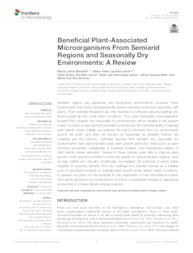Beneficial plant-associated microorganisms from Semiarid regions and seasonally dry environments: a review.
Beneficial plant-associated microorganisms from Semiarid regions and seasonally dry environments: a review.
Author(s): BONATELLI, M. L.; LACERDA JÚNIOR, G. V.; REIS JUNIOR, F. B. dos; FERNANDES JUNIOR, P. I.; MELO, I. S. de; QUECINE, N. C.
Summary: Semiarid regions are apparently low biodiversity environments; however, these environments may host a phylogenetically diverse microbial community a asociated with plants. Their microbial inhabitants are often recruited to withstand stressful settings and improve plant growth under harsh conditions. Thus, plant-associated microorganisms isolated from semiarid and seasonally dry environments will be detailed in the present review, focusing on plant growth promotion potential and the microbial ability to alleviate plant abiotic stress. Initially, we explored the role of microbes from dry environments around the world, and then, we focused on seasonally dry Brazilian biomes, the Caatinga and the Cerrado. Cultivable bacteria from semiarid and seasonally dry environments have demonstrated great plant growth promotion traits such as plant hormone production, mobilization of insoluble nutrients, and mechanisms related to plant abiotic stress alleviation. Several of these isolates were able to improve plant growth under stressful conditions commonly present in typical semiarid regions, such as high salinity and drought. Additionally, we highlight the potential of plants highly adapted to seasonal climates from the Caatinga and Cerrado biomes as a suitable pool of microbial inoculants to maintain plant growth under abiotic stress conditions. In general, we point out the potential for the exploitation of new microbial inoculants from plants growing in dry environments to ensure a sustainable increase in agricultural productivity in a future climate change scenario.
Publication year: 2021
Types of publication: Journal article
Unit: Embrapa Semi-arid Region
Keywords: Ambientes sazonalmente secos, Bactéria promotora, Bactérias promotoras, Biodiversidade, Bioma Caatinga, Bioma Cerrado, Caatinga, Cerrado, Crescimento da planta, Crescimento de plantas, Estresse abiótico, Estresse abiótico de plantas, Hormônio Vegetal, Microrganismo, Nutriente, Nutriente insolúvel, Plant growth, Plant growth-promoting rhizobacteria, Planta, Resistência a Seca, Salinidade, Seca, Semiárido
Observation
Some of Embrapa's publications are published as ePub files. To read them, use or download one of the following free software options to your computer or mobile device. Android: Google Play Books; IOS: iBooks; Windows and Linux: Calibre.
Access other publications
Access the Agricultural Research Database (BDPA) to consult Embrapa's full library collection and records.
Visit Embrapa Bookstore to purchase books and other publications sold by Embrapa.

